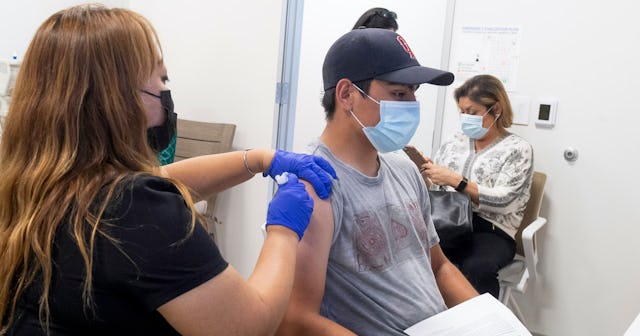Pfizer Is Seeking Authorization For Booster Shots For 16- And 17-Year-Olds

Reports say that Pfizer will request authorization for 16- and 17-year-olds to start receiving COVID-19 boosters ahead of the Omicron variant
With news of the newly discovered Omicron variant, the entire world seems on edge. While no cases of the new variant have yet been detected in the U.S., President Joe Biden is exhorting all Americans to get vaccinated if they haven’t already, and to get booster shots to better protect them against Omicron, Delta, and other variants of COVID-19. All adults are currently eligible for boosters, no matter which vaccine they received, and Pfizer is now looking to expand eligibility even further — by authorizing its boosters for teens ages 16 and 17.
Pfizer is expected to ask the FDA to authorize boosters for 16- and 17-year-olds any day now, according to insiders at the company who spoke to the Washington Post. Currently, only Americans 18 and older are eligible for boosters — after 6 months if they originally received Pfizer or Moderna shots, and after 2 months if they received Johnson and Johnson.
Pfizer’s vaccine was originally approved for anyone 16 and up, which means there’s just as much real-world data about its safety and efficacy in 16- and 17-year-olds as there is for adults. That, coupled with safety data from clinical trials and studies in Israel, is reportedly influencing Pfizer’s decision to seek approval for boosters just for those older teens. Since younger kids ages 12 and up were approved for COVID vaccines later, there’s less data on whether booster shots are safe and effective enough to be authorized for them just yet.
Studies have shown that while some adolescents have experienced a side effect called myocarditis, which is swelling in the heart, contracting COVID comes with a much higher risk of heart damage than the vaccine. Side effects for teenagers who receive Pfizer shots are rare and typically mild, experts say.
Jeanne Marrazzo, an infectious-disease physician at the University of Alabama at Birmingham, told the Washington Post that the U.S. should do everything it can to increase protection for people, and any efforts “before omicron hits can potentially help and certainly won’t hurt.”
Eric Topol, a professor of molecular medicine at Scripps Research, agreed that those who have been fully vaccinated with Pfizer shots should all get boosters.
“This is a three-shot vaccine for all, as we’ve clearly learned,” he said.
Biden has called vaccines “the best protection against this new variant or any of the variants out there,” and is doubling down on his calls for more shots (including boosters) since Omicron was discovered.